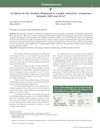 21 citations,
September 2019 in “Archives of Physiology and Biochemistry”
21 citations,
September 2019 in “Archives of Physiology and Biochemistry” High-intensity interval training improves certain hormone levels and lipid profiles in women with PCOS.
 1 citations,
January 2023 in “Brazilian Journals Editora eBooks”
1 citations,
January 2023 in “Brazilian Journals Editora eBooks” Children's screen time increased during the pandemic, causing various health issues.

Hair aging leads to color loss and reduced density, and dermatologists are key in treating it to improve quality of life.
 August 2023 in “Anales de la Facultad de Ciencias Médicas”
August 2023 in “Anales de la Facultad de Ciencias Médicas” The patient with lupus and hair loss improved with oral and topical minoxidil.
May 2023 in “MQRInvestigar” A young dog with an enlarged prostate and cysts improved significantly after treatment and surgery.
 5 citations,
May 2019 in “Hormone and Metabolic Research”
5 citations,
May 2019 in “Hormone and Metabolic Research” Women with nonclassic 21-hydroxylase deficiency can have successful pregnancies through IVF, with certain factors affecting their chances.

The hair masks are safe, stable, and effective for hair care.
 4 citations,
January 2019 in “Elsevier eBooks”
4 citations,
January 2019 in “Elsevier eBooks” Finding new uses for existing drugs is promising and can lead to safer, more effective medicines.
 July 2022 in “Research, Society and Development”
July 2022 in “Research, Society and Development” The conclusion is that different treatments improved hair growth in dogs with Alopecia X, but results varied and not all dogs had complete hair regrowth.
 December 2021 in “Aegean journal of obstetrics and gynecology”
December 2021 in “Aegean journal of obstetrics and gynecology” A woman's male-like physical changes were caused by two rare ovarian conditions.
 May 2023 in “Brazilian Journal of Animal and Environmental Research”
May 2023 in “Brazilian Journal of Animal and Environmental Research” Photobiomodulation effectively treats hair loss in dogs with black hair follicular dysplasia.
 2 citations,
January 2022 in “Genetics Research”
2 citations,
January 2022 in “Genetics Research” Using hemocoagulase with platelet-rich plasma in hip replacement can lessen blood loss and improve healing and blood clotting.
 June 2015 in “Biomedical and biopharmaceutical research”
June 2015 in “Biomedical and biopharmaceutical research” The congress showed advancements in skin hydration, barrier function, and safe, effective new cosmetic formulations.
 16 citations,
September 2015 in “Journal of Ethnopharmacology”
16 citations,
September 2015 in “Journal of Ethnopharmacology” The document concludes that "Dictamnus" has a rich cultural history and potential as a herbal medicine, warranting more research into its effects and safety.
 14 citations,
January 2015 in “ABCD”
14 citations,
January 2015 in “ABCD” The surgery effectively promoted and maintained weight loss in obese women during the first year.
 July 2022 in “Forte Journal”
July 2022 in “Forte Journal” Higher concentrations of bitter melon extract increase hair growth, with 15% being the most effective.
 2 citations,
May 2021 in “Case reports in dermatological medicine”
2 citations,
May 2021 in “Case reports in dermatological medicine” A 28-year-old man with type 1 diabetes had skin and hair issues due to zinc deficiency.

An 11-year-old female Pinscher with Pemphigus Foliaceus was successfully diagnosed and treated.
 April 2024 in “ScienceRise. Pharmaceutical science”
April 2024 in “ScienceRise. Pharmaceutical science” Men with hair loss feel it affects their emotions and life quality, and want more effective treatments.
 January 2024 in “International Journal of Health Science”
January 2024 in “International Journal of Health Science” Scalp cooling and low-power light therapy show promise in reducing chemotherapy-induced hair loss but need more research.
 January 2021 in “Acta Scientiae Veterinariae”
January 2021 in “Acta Scientiae Veterinariae” Levothyroxine effectively treated a dog's skin and hair problems caused by hypothyroidism.
 11 citations,
June 2017 in “Anais Brasileiros de Dermatologia”
11 citations,
June 2017 in “Anais Brasileiros de Dermatologia” More people were diagnosed with certain skin diseases and sexually transmitted diseases in 2014 compared to 2003 in a Brazilian public institution.
September 2020 in “Eureka: Health Sciences” The emulgel with specific ingredients was effective for treating hair loss.
 8 citations,
March 2021 in “Medicine”
8 citations,
March 2021 in “Medicine” The revised Chinese Symptom Checklist-90 is more reliable and valid for psychological assessments.
 3 citations,
August 2012 in “Annals of Diagnostic Pathology”
3 citations,
August 2012 in “Annals of Diagnostic Pathology” AIDS may cause changes in the scalp that increase infection risk and hair loss.
 19 citations,
January 2011 in “Obstetrics and gynecology international”
19 citations,
January 2011 in “Obstetrics and gynecology international” Red clover extract improved hair, skin, mood, sleep, and tiredness in postmenopausal women.
September 2022 in “Ukraïnsʹkij naukovo-medičnij molodìžnij žurnal” Quality pharmaceutical care is crucial for safe and effective use of vitamin-mineral supplements during pregnancy and breastfeeding.
 January 2025 in “Seven Editora eBooks”
January 2025 in “Seven Editora eBooks” Orchiectomy and melatonin helped a German Spitz regrow some hair.

A new minoxidil regimen improved hair loss in a lupus patient.
 April 2023 in “Tropical Animal Health and Production”
April 2023 in “Tropical Animal Health and Production” Giving melatonin to sheep before the non-breeding season can improve their chances of reproducing in northwest Mexico.



























